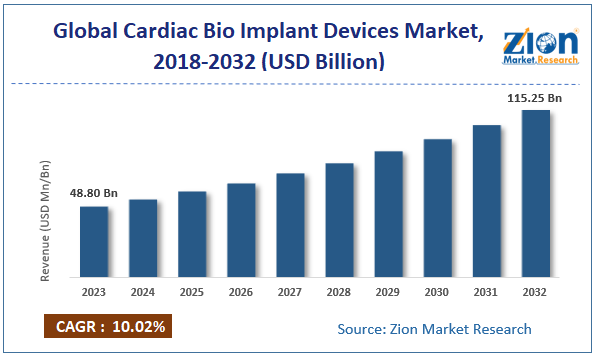Cardiac Bio Implant Devices Market Size, Share Report, Analysis, Trends, Growth 2032
The cardiac bio-implant devices market is a specialized segment of the medical devices industry focused on the development, production, and distribution of implants used to treat various heart-related conditions. These devices are designed to support, replace, or enhance the function of the heart, and they are essential in managing cardiovascular diseases, which are a leading cause of death globally.

Get a Free Sample : https://www.zionmarketresearch.com/sample/cardiac-bio-implant-devices-market
Key Market Insights
Market Growth Drivers:
- Rising Prevalence of Cardiovascular Diseases (CVDs): The global increase in CVDs, including heart failure, arrhythmias, and coronary artery disease, is a significant driver of the cardiac bio-implant devices market.
- Aging Population: The growing elderly population, which is more prone to heart conditions, is fueling demand for cardiac bio-implants.
- Advancements in Implant Technology: Technological innovations, such as biocompatible materials, miniaturization, and improved battery life, are enhancing the effectiveness and adoption of cardiac implants.
- Increasing Adoption of Minimally Invasive Procedures: The shift towards minimally invasive cardiac procedures, which offer faster recovery and lower risk, is boosting the demand for implantable devices that can be inserted through less invasive methods.
Market Segmentation:
- By Product Type:
- Pacemakers: Devices that regulate heartbeats by delivering electrical pulses to the heart muscle.
- Implantable Cardioverter Defibrillators (ICDs): Devices that detect and correct life-threatening arrhythmias by delivering shocks to the heart.
- Cardiac Resynchronization Therapy (CRT) Devices: Used to improve the heart's rhythm and function in patients with heart failure.
- Heart Valves: Bio-implants used to replace damaged or diseased heart valves.
- Ventricular Assist Devices (VADs): Mechanical pumps that support heart function in patients with severe heart failure.
- Stents and Grafts: Devices used to keep blood vessels open and prevent blockages.
- By Material:
- Biodegradable Materials: Materials that degrade over time within the body, reducing the need for additional surgeries.
- Synthetic Materials: Durable and long-lasting materials used in permanent implants.
- Biological Materials: Derived from animal or human tissue, used in heart valves and grafts.
- By End-User:
- Hospitals: The primary end-users, as most cardiac bio-implant procedures are performed in hospital settings.
- Ambulatory Surgical Centers: Increasingly used for less complex implant procedures.
- Specialized Cardiac Clinics: Focused on treating heart-related conditions and performing implant procedures.
- By Product Type:
Geographical Insights:
- North America: The largest market due to high healthcare expenditure, advanced healthcare infrastructure, and a significant number of patients with cardiovascular diseases.
- Europe: A strong market driven by a large aging population, high prevalence of CVDs, and supportive government policies.
- Asia-Pacific: Expected to witness significant growth due to increasing healthcare investments, improving healthcare infrastructure, and a rising incidence of heart diseases.
- Latin America and Middle East & Africa: Emerging markets with growing healthcare awareness and improving access to advanced medical technologies.
Challenges:
- High Cost of Implants: The high cost of cardiac bio-implant devices, particularly advanced technologies, can be a barrier to adoption, especially in developing regions.
- Regulatory Hurdles: The stringent regulatory requirements for cardiac implants, including rigorous testing for safety and efficacy, can delay market entry and product approvals.
- Risk of Complications: Potential complications associated with implant procedures, such as infections, device malfunctions, or the need for re-operations, can limit patient acceptance and market growth.
Competitive Landscape:
- Key Players: Leading companies in the market include Medtronic, Boston Scientific, Abbott Laboratories, Edwards Lifesciences, and Biotronik. These companies focus on innovation, strategic acquisitions, and expanding their product portfolios to maintain market leadership.
- Product Development: There is a strong emphasis on developing next-generation devices with improved safety, efficacy, and patient comfort, as well as exploring new materials and technologies.
Future Trends
- Biodegradable and Bioresorbable Implants: The development of implants that degrade naturally within the body is expected to grow, offering potential for reduced long-term complications and the need for secondary surgeries.
- Wearable and Wireless Technology: Integration of wireless communication and wearable devices with cardiac implants is likely to increase, allowing for continuous monitoring and remote management of heart conditions.
- Artificial Intelligence (AI) and Machine Learning: The use of AI and machine learning in cardiac care is expected to enhance the functionality of implantable devices, allowing for predictive analytics and personalized treatment plans.
- 3D Printing and Personalized Implants: Advances in 3D printing technology may enable the creation of customized cardiac implants tailored to individual patient anatomy, improving outcomes and reducing risks.
The cardiac bio-implant devices market is poised for significant growth as technological advancements, an aging population, and the increasing burden of cardiovascular diseases drive demand for innovative, effective, and safe cardiac implants. As the market evolves, the focus will continue to shift towards more personalized, minimally invasive, and biocompatible solutions that improve patient outcomes and quality of life.
Contact :
US OFFICE NO +1 (302) 444-0166
US/CAN TOLL FREE +1 (855) 465-4651
Email: sales@zionmarketresearch.com


Comments
Post a Comment